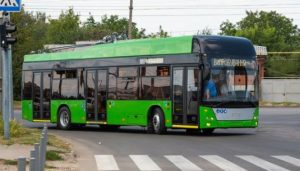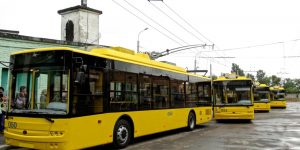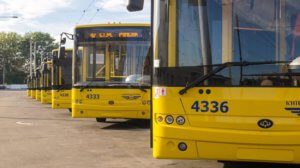
Bogdan Corporation, in a consortium with Czech company Tram For Envi, will supply six new autonomous trolleybuses for the transport company in Jihlava (the Czech Republic) following a tender in which the consortium was declared the winner almost a year ago, the corporation said on its Facebook page on Saturday with reference to the Czech media.
“For the first time, the Ukrainian manufacturer has managed to penetrate the Czech market with new trolleybuses. The signing of the contract can be seen from the data in the register of contracts. The contract was signed almost a year after the transport company Jihlava had declared the association the winner. The purchase will be financed through a European subsidy,” the Czech ezine Zdopravy.cz quoted Bogdan corporation as saying.
According to the contract, the Bogdan T70120 trolleybuses must be adapted to the requirements of the Czech market, in particular, the electrical equipment for them must be supplied by the Czech company Cegelec. The delivery time is estimated at 14 months.
The Czech newspaper notes that before that, for many years, only Škoda Electric had won contracts for the supply of trolleybuses, and the arrival of other manufacturers began to lead to significant price reductions.
As reported, in May 2020, a tender proposal of Bogdan Corporation in a consortium with Czech TRAM FOR ENVI s.r.o. was declared the best in a tender to supply six trolleybuses fitted with traction batteries for autonomous running for a transport company of Jihlava (the Czech Republic). The Czech-Ukrainian consortium offered trolleybuses for CZK 71.4 million (about EUR 2.64 million) or CZK 11.9 million for one trolleybus (EUR 440,300) with an estimated purchase amount of being CZK 82.74 million (EUR 3.06 million).
At the same time, Škoda Electric, which participated in the tender, offered a price of CZK 82.17 million (EUR 3.04 million) or CZK 13.695 million for a trolleybus.

Kharkiv received the first low-floor, one-section trolleybus out of 49 comfortable trolleybuses purchased under loans from the European Investment Bank (EIB).
According to the press service of the Ministry of Infrastructure of Ukraine on Thursday, October 22, this became possible due to the participation of Kharkiv in the Ukraine Urban Public Transport project, which is a framework loan from the EIB.
As part of the project, the city received a EUR 10 million loan for the renewal of the trolleybus fleet.
“Kharkiv became one of the 11 member cities and has already received today the first low-floor trolleybus out of 49. By the end of the year we hope to conclude an agreement with the EIB on the implementation of the second part of the project Urban Public Transport II, which will provide for the purchase of only environmentally friendly transport. I am sincerely grateful to our partners from the EIB, who support us both in the implementation and in the continuation of this important project for the cities,” Minister of Infrastructure of Ukraine Vladyslav Krykliy said.
Trolleybuses for Kharkiv were manufactured by the subsidiary Car Assembly Plant No.1 of Automobile Company Bogdan Motors.
According to the delivery schedule, 49 trolleybuses will arrive in Kharkiv by the end of 2021. The whole delivery will include 12 two-section and 37 single-section trolleybuses.

The International Finance Corporation (IFC) from the World Bank Group could issue EUR 32 million to Lvivelektrotrans municipal company for the purchase of 100 trolleybuses and reconstruction of contact networks.
According to the IFC’s website, the board of directors of the financial corporation intends to consider the relevant issue on April 30.
According to the report, in addition, within the framework of the Cities of Ukraine program, the IFC provides advisory support to Lviv on the issue of modernizing the city’s public transport system.
The report notes that at present public transport in Lviv is provided by two municipal operators: ATP-1, which operates about 200 buses daily, and Lvivelektrotrans (about 80 trams and 65 trolleybuses daily).
There are also four private operators that operate about 250 buses, most of which are small-capacity diesel buses (also known as minibuses). About 60% of passengers are transported by buses, 25% by trams and 15% by trolleybuses, the financial corporation said.
After the commissioning of new trolleybuses, it will be possible to modernize the overall system and optimize the public transport network.

Ukraine under the Ukraine Urban Public Transport Project of the European Investment Bank (EIB) plans to buy 227 buses, 153 trolleybuses, 56 trams and 35 subway wagons in 2019, according to a posting on the website of the Infrastructure Ministry.
“The Infrastructure Ministry together with the Finance Ministry and local governments (11 cities) are implementing the EIB project, which main goals are to implement subprojects in the cities of Ukraine to develop environmentally friendly and socially significant transport,” the ministry said.
The project provides for the renewal of the fleet of buses, trolleybuses, trams, metro cars, construction and reconstruction of tram and trolleybus lines, funicular, replacement of traction substations, introduction of modern fare collection systems and information systems using borrowed funds from the EIB and EBRD.
According to the Infrastructure Ministry, in particular, in 2018, under the project 167 trolleybuses were purchased, including 47 units for Odesa, 40 units for Kremenchuk, 23 trolleybuses delivered to Dnipro, 10 to Kremenchuk, and eight – to Kryvy Rih.
Thanks to these purchases, taking into account the trolleybus fleet in these cities as of January 1, 2018, Odesa has now updated its fleet by 28%, Kremenchuk – by 70%, Dnipro – by 17%, Rivne and Kryvy Rih – by 10% each.
As reported, in April 2017, Ukraine’s Verkhovna Rada passed a bill ratifying the financial agreement between Ukraine and the EIB under the Ukraine Urban Public Transport Project.
The approximate total cost of the project is EUR 400 million.